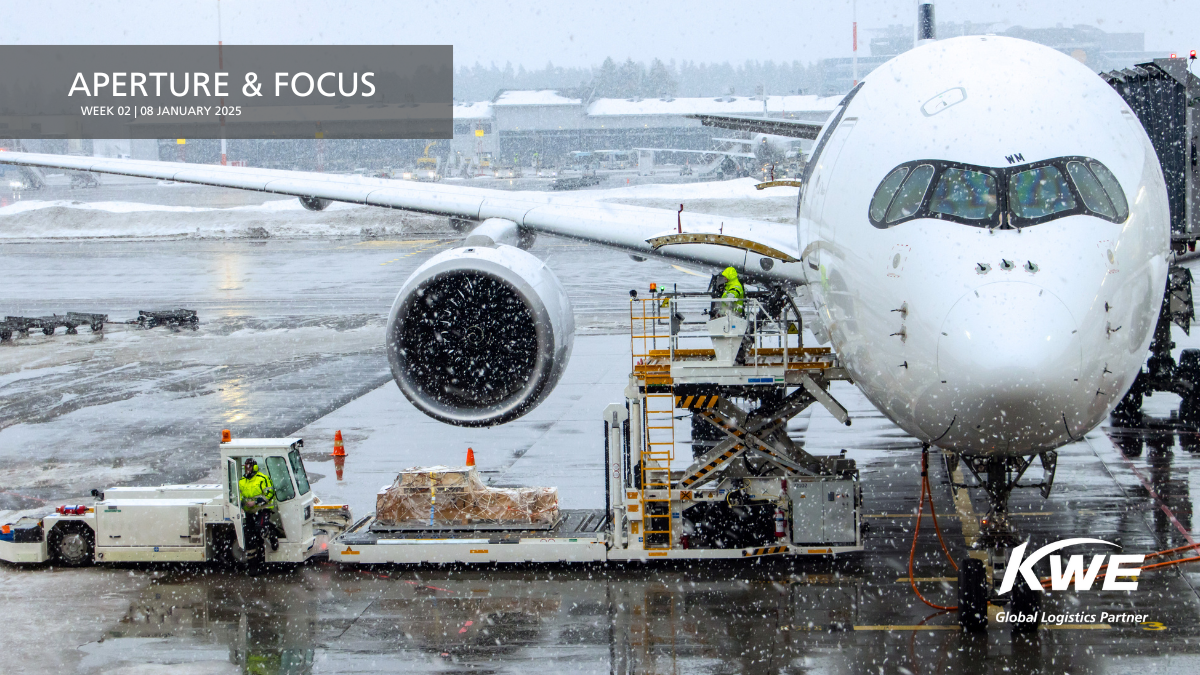Quote
Aperture & Focus 2025: Week 1-2

Global Aperture
Severe winter weather beginning January 5th caused widespread flight disruptions across Europe and the United States, with major airports including London Heathrow and Manchester (UK), Frankfurt (Germany), and Amsterdam Schiphol (Netherlands) experiencing significant cancellations and delays. In the U.S., states such as Kentucky, Virginia, and West Virginia declared emergencies, impacting operations at key hubs like Louisville Muhammad Ali International Airport (Kentucky), Washington Dulles International Airport (Virginia), and Yeager Airport (West Virginia), affecting both passenger travel and cargo operations across critical air corridors. While parts of the country face freezing conditions, wildfires are threatening Southern California, further complicating logistics and transportation operations.
Starting in 2025, FuelEU imposes significant penalties on shipowners for failing to meet emissions standards, with these penalties expected to increase substantially over time. Shipowners can mitigate these penalties through strategies like pooling emissions with low- or zero-emission vessels, adopting biofuels, or retrofitting existing ships, with collaboration among stakeholders being key to success.
Regional Focus
Americas
United States: A winter storm on January 6th has disrupted operations across Midwest and East Coast impacting air and rail freight as of January 7th. Several rail routes have been suspended and airports in Washington, D.C., Baltimore, and St. Louis have canceled nearly 2,000 flights and over delayed 2,400 flights.
Negotiations between the ILA and USMX resumed on January 7th, with automation and job roles remaining as the central topic of discussion. With the union contract expiring on January 15th, importers are being urged by carriers to clear cargo to avoid delays at U.S. East and Gulf coast ports, as unresolved labor talks could lead to a strike.
Brazil: Brazil's trade surplus decreased by nearly 25% in 2024, driven by a 9% rise in imports due to strong domestic demand and higher capital goods investments. Exports remained steady, but there were declines in key commodities like soybeans, corn, and iron ore. For 2025, recovering agricultural exports and stabilizing supply chains will shape the countries trade strategies.
Asia-Pacific
Australia: The Port of Brisbane is set to experience a series of 24-hour work stoppages from January 8th to 14th, as part of the Maritime Union of Australia's (MUA) push for better wages and working conditions. Despite ongoing negotiations with unions covered under the Qube Ports Pty Ltd Port of Brisbane Enterprise Agreement 2020 and the port, the unresolved disputes would disrupt port operations and create cargo backlogs.
Bangladesh: The Port of Chittagong achieved record growth in 2024, with a 7.4% increase from 2023, as both the port and its inland container depots saw significant gains in export container handling despite challenges from political unrest and flooding. To sustain this momentum, the port will implement a strategic operational shift, delivering all imported full container load (FCL) containers through the off-docks instead of the port yard. This change will free up yard space, enabling the port to handle a higher volume of containers efficiently.
China: On January 4th, China announced 15 measures to enhance logistics and transportation infrastructure in its western provinces, including building international aviation hubs in cities like Chengdu and Chongqing and developing integrated rail, river, and sea links. These initiatives aim to address economic disparities with coastal regions, expand trade corridors to Europe and South Asia, and strengthen regional connectivity through bonded zones.
Europe, Middle East & Africa
Britian: On January 5th, severe winter weather caused significant disruptions to road, rail, and air travel, with Manchester (MAN) and Liverpool (LPL) airports temporarily closing all runways, London Heathrow (LHR) Airport flights delayed, and dozens of trains delayed or canceled. Flooding throughout the country has occurred due to rain and melting snow. The severe weather conditions are expected to persist through January 8th.
Germany: Frankfurt Airport (FRA) canceled over 100 flights, while Munich Airport (MUC) operated with only one open runway on January 5th, as heavy snow and freezing rain limited cargo and passenger operations. Both airports are actively clearing snow and ice from their runways, but the process is prolonged due to persistent adverse conditions.
Egypt: Suez Canal successfully tested a new 10 km two-way channel extension near its southern end, aimed at increasing capacity and improving emergency handling. This expansion, despite a 60% drop in revenue due to Houthi militant attacks, will enhance daily traffic by 6 to 8 ships, boosting the canal's efficiency.